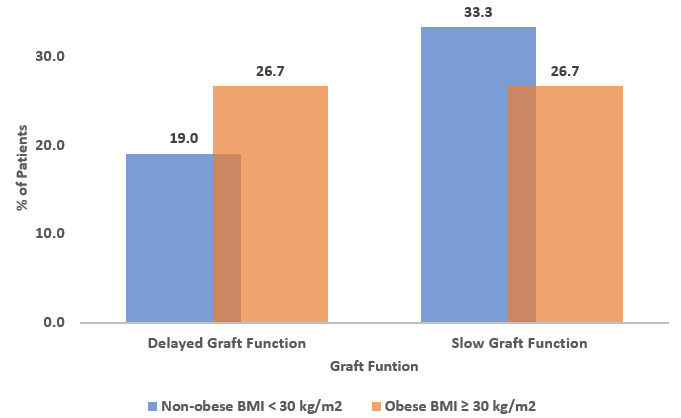Role of Body Mass Index in Determining Outcomes after Renal Transplantation:A Retrospective Single-Centre Observational Study.
Binay BG Gurung 1, Shafiq Chughtai 1, Shakeeb SK Khan 1, Ahmed AA Ali1, Rajagopal RP Poyamazhi 1.
1Leicester General Hospital , Leicester General Hospital , Leicester, United Kingdom
Introduction: The impact of obesity on graft function in renal transplant recipients (RTR) is still controversial. Many centres set an upper limit on recipient body mass index (BMI) when considering patient's suitable for transplantation, however the optimal cut-off BMI is yet to be established. The aim of this study was to compare the outcomes between obese and non-obese RTRs based on their pre-transplantation BMI.
Materials and Methods: RTRs at the Leicester Renal Transplant Unit between 01 January 2016 and 31 December 2016 were retrospectively studied. Data was collected from the electronic renal database The World Health Organisation International Classification of adult weight was used to categorise patient’s BMI (Obese BMI ≥ 30 kg/m2, Non-Obese < 30 kg/m2). BMI was then compared with serum creatinine at 3 months post transplantation.
Results: A total of 93 recipients were studied of which, 32.2% (n=30) were obese and 67.8% (n=63) were non-obese. 26.7% of obese recipients had delayed graft function compared to 19% non-obese recipients.33.3% of non-obese recipients had slow graft function compared to 26.7% of obese recipients. Majority of the patients irrespective of BMI had serum creatinine levels between 101 to 200 μmol/L.

Rejections rates were 13.3% (n=4) in Obese vs 7.9% in Non-Obese recipients (n=5).
Conclusion: Obesity appears to be associated with higher risk of delayed graft function and rejection episodes when compared with Non-Obese recipients. Clinicians should try to incorporate adequate nutritional resuscitation and weight reduction strategies when preparing recipients towards kidney transplantation. Studies are needed to assess long term effect of recipient’s BMI on transplant outcome.
